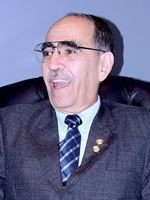AS/COA Online | Interview: El Salvador's Ambassador to the U.S. Rubén Zamora
/“[W]e have started what we call the two-track policy—continuing with the fight against crime in the country by stage agencies, but at the same time, town by town, trying to develop conditions for preventing violence and reintegrating those people into society in a productive way.”
 Appointed last month as the new Salvadoran ambassador in Washington, Rubén Zamora spoke with AS/COA Online’s Carin Zissis about the evolution of U.S.-Central American security policy in light of President Barack Obama’s recent trip to the region, saying: “Now the Obama administration is moving towards a more comprehensive approach, using the mantra, I would say, of partnership.” The ambassador also gave an overview of the Salvadoran government’s local strategies to drive down crime, as well as how to leverage initiatives such as the Partnership for Growth and CAFTA-DR. With a political career dating back to 1970, Zamora served twice as a legislative deputy in El Salvador’s National Assembly, was a member of the country’s Peace Commission, and ran, in 1994, as the first presidential candidate of the left’s coalition after the 1992 Peace Accords. More recently, he held the post of ambassador to India.
Appointed last month as the new Salvadoran ambassador in Washington, Rubén Zamora spoke with AS/COA Online’s Carin Zissis about the evolution of U.S.-Central American security policy in light of President Barack Obama’s recent trip to the region, saying: “Now the Obama administration is moving towards a more comprehensive approach, using the mantra, I would say, of partnership.” The ambassador also gave an overview of the Salvadoran government’s local strategies to drive down crime, as well as how to leverage initiatives such as the Partnership for Growth and CAFTA-DR. With a political career dating back to 1970, Zamora served twice as a legislative deputy in El Salvador’s National Assembly, was a member of the country’s Peace Commission, and ran, in 1994, as the first presidential candidate of the left’s coalition after the 1992 Peace Accords. More recently, he held the post of ambassador to India.
AS/COA Online: In light of U.S. President Barack Obama’s recent meeting with leaders in Costa Rica, including with President of El Salvador Mauricio Funes, what were some of the accomplishments? And what more do you think should have been done?
Ambassador Zamora: For us, the meeting between President Obama and the seven Central American and Caribbean head of states was important because we learned about U.S. foreign policy on Central America. The discussion was very frank among the presidents and it was clear for us—and this seems to me an important achievement—that President Obama clearly was for a more integrated approach to the question of security. That was one of the main issues in the talks among the heads of states. We had mostly been used to the United States insisting more and more on the question of controlling crime; that is necessary, but is very insufficient to achieve results. Now, it seems to me, Washington is having a more comprehensive, holistic approach to the problem that we are facing in Central America, both in terms of the crime and in terms of Central America being a region through which South American drugs travel to the United States.
AS/COA Online: In connection with that, I wanted to ask about CARSI [Central America Regional Security Initiative]. In March, Assistant Secretary of State for International Narcotics and Law Enforcement Affairs William R. Brownfield gave remarks at our organization, and he said: “What we are doing today is actually very different from what we thought we were going to be doing four years ago.” What do you think needs to happen to improve security cooperation on a regional level? And how would you suggest that CARSI could evolve further?
Zamora: The starting point now is that the best strategic view when it comes to security in Central America, especially in the northern part—that means Guatemala, Honduras, and El Salvador—is that you have to attack the problem with a two or three-track policy. You cannot do it just with a single line of policy, or the tactic of controlling crime without addressing the question of the rehabilitation of gang members into mainstream society...
